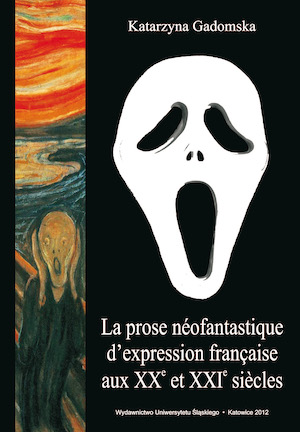La prose néofantastique d’expression française aux XXe et XXIe siècles
Neo‑fantastic prose of the French‑speaking area in the 20th and 21st centuries
Author(s): Katarzyna Gadomska
Subject(s): History, Language and Literature Studies, Cultural history, Studies of Literature, French Literature, Theory of Literature
Published by: Wydawnictwo Uniwersytetu Śląskiego
Keywords: fantasy; fear; vampire; ghost; psychopath; doppelgänger
Summary/Abstract: The work constitutes an attempt to describe the poetics of the 20th and 21st century neo‑fantastic prose of selected French‑speaking countries (France, Belgium, Quebec). The analyses of the material made use of such research methods as a semiotic description of the character (A. Greimas’ actantial model), Ph. Hamon’s semiological model and U. Eco and V. Jouve’s semiopragmatic method.
The first chapter covers basic elements of the world presented in literary works: time, space, their chronotop (M. Bachtin) and personage, responsible for creating a mimetic illusion crucial to the formation of the fantastic effect. The next chapter was devoted to the manifestations of “a fantastic phenomenon”, taking on the shapes of the following anxiogenic figures: a ghost, vampire, psychopath (also in gore movie), double, woman, fear‑evoking objects. The next chapter concentrated on the presentation of special ethics and aesthetics of fantastic prose these days, describing above all the evil, ugliness, the negative and repulsive (all possible perversions and sexual deviations, pure evil, cruelty). The last chapter discusses the form of works within the scope of “new fantastic literature”: selected elements of a paratext according to G. Genette (an incipit, excipit, preface), forms and structures of narration, as well as traditional and new writing techniques typical of the genre of fantastic literature exclusively.
A conclusion constitutes an attempt to answer the question on the scope within which contemporary fantastic literature modifies definitions of traditional fantastic literature and to what an extent it continues or diverges from canonic fantastic literature. The appendix includes versions of “urban legends” in extenso, as well as notes bringing the profiles of the French‑speaking writers closer.
- E-ISBN-13: 978-83-8012-555-1
- Print-ISBN-13: 978-83-226-2107-3
- Page Count: 290
- Publication Year: 2012
- Language: French
- eBook-PDF
- Table of Content
- Introduction

